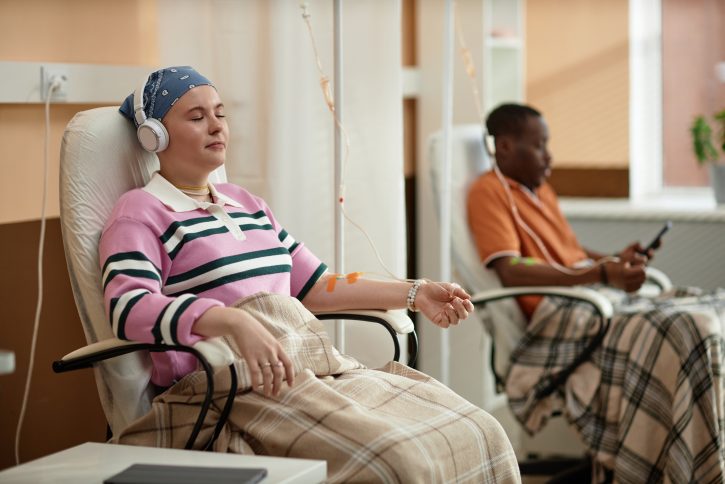
Cancer-related side effects can make living your daily life frustrating or difficult. There are several side effects commonly experienced by cancer patients, but they can vary depending on the type of cancer, its location, the specific treatments used or the patient’s overall health. Read below for an overview of common side effects you may experience during cancer treatment.
Fatigue
Cancer-related fatigue is a physical, emotional and mental feeling of tiredness or exhaustion that doesn’t get better with rest or sleep. It is often worse and harder to manage than the fatigue people who don’t have cancer get.
You may feel more tired than usual during or after activity, too tired to do the things you normally do, like your arms and legs are heavy and hard to move, very weak or like you can’t concentrate or focus your thoughts.
There are things you can do to help manage your fatigue like:
- Staying as active as you can with your doctor’s permission
- Conserving your energy by focusing on the things you need or want to do first, when you have the most energy
- Lowering your stress, eating well and getting good sleep
Pain
People with cancer may have pain caused by the cancer itself or as a side effect of treatment. It can make other symptoms or side effects seem worse, but nearly all cancer pain can be managed, with or without the use of medication.
Tell your care team about any type of pain you experience. Their role is to help manage your pain by listening to your concerns and offering a solution. They may ask you to explain the intensity of the pain using a scale from 0 to 10, or using words like, “burning,” “stabbing,” or “throbbing” to describe the pain. You can also write down your thoughts about your pain.
Nausea and Vomiting
Nausea and vomiting are common side effects of cancer and its treatment. Nausea is feeling like you are going to vomit, and vomiting (throwing up) is when the contents of your stomach come out of your mouth. Many types of chemotherapy can cause mild to severe nausea and vomiting.
Mild nausea and vomiting can be uncomfortable, but it usually does not cause serious problems. Vomiting becomes a problem when it happens often and a lot because it can cause dehydration, weight loss and depression.
Medication to help prevent nausea and vomiting can be prescribed. Other options may help, like distraction, relaxation, positive imagery, acupuncture or physical therapy. Talk to your care team about your options, and if your symptoms do not stop, or get worse.
Appetite Loss
Loss of appetite is a common symptom in people with cancer as a side effect of treatment. You may eat less than usual, have no feelings of hunger or feel full after eating only a small amount. Ongoing appetite loss may lead to weight loss, malnutrition, fatigue and weakness from muscle loss. There is no test that can diagnose poor appetite, so it is important to let your doctor know if you experience appetite loss.
Ask your care team for tips to help you get the calories and nutrients your body needs to maintain a healthy weight, even when your appetite is poor. Your care team may also recommend that you meet with a registered dietitian for nutrition therapy to help you maintain a healthy weight. Click here to learn more about Nutrition Therapy at FMC.
Hair Loss
Some cancer treatments cause people to lose some or all their hair. If you have cancer and are about to start chemotherapy, the chance of hair loss is very real. People with cancer report hair loss as one of the side effects they fear the most as they begin cancer treatment. Hair usually grows back, and there are things you can do to make it less of a problem for you.
Chemotherapy uses powerful medicines that attack fast-growing cancer cells. The medicines also hurt other fast-growing cells in your body, including cells in your hair roots. Chemotherapy may cause hair loss all over your body, not just on your scalp, including your eyelashes, eyebrows and armpits.
There are some things you can do to prepare for hair loss:
- Your scalp may feel itchy or sensitive. Be gentle when handling your hair.
- Try not to brush or pull your hair too much.
- Talk to your care team about whether a cooling cap might reduce your risk. More research is being done to learn whether cooling caps work and are safe.
This list of side effects is not exhaustive, and many other side effects can occur. Talk with your care team if you are experiencing any side effects to ensure they are property managed. We are here to help you.
To learn more about cancer services at Fairfield Medical Center, click here.